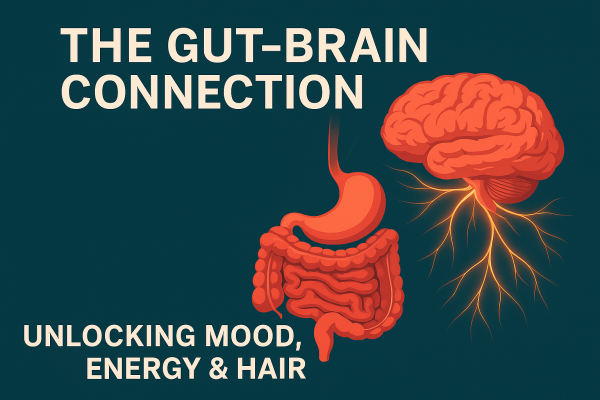
Your gut does more than digest food—it’s a powerful control center that directly impacts your mental health, energy levels, immune system, hormones, and even your hair.
In a recent discussion, functional medicine expert Dr. Justin Marchegiani and clinical nutritionist Evan Brand explored how hidden infections, environmental toxins, and microbiome imbalances can lead to chronic issues like anxiety, fatigue, and thinning hair. The key message? You can’t heal what you can’t see—functional lab testing is essential.

One of the most overlooked causes of mood issues is gut infection.
Dr. J shared his battle with Helicobacter pylori (H. pylori), a bacterial infection that caused noticeable anxiety and mood fluctuations. Peer-reviewed studies confirm this link: a PubMed search for “H. pylori mood” or “H. pylori anxiety” reveals surprising results connecting this bacteria to neuropsychiatric symptoms.
But H. pylori isn’t the only villain. Functional stool tests often reveal other stealth infections—like Klebsiella, Candida, and Blastocystis hominis—that impact neurotransmitters, promote inflammation, and trigger a cascade of symptoms, including fatigue, brain fog, and immune dysfunction.
❗Conventional medicine often overlooks this connection. Mood disorders are frequently medicated without assessing gut function.
Traditional psychiatry focuses on symptom management—typically with antidepressants, anti-anxiety meds, or stimulants. While these drugs may provide short-term relief, they often keep the body in a chronically stressed (sympathetic) state. This worsens hormonal imbalances, disrupts sleep, and prevents the body from healing.
Functional medicine takes a different approach: it identifies the root cause and supports the body’s natural ability to heal. This begins with the gut.
Environmental toxins, especially glyphosate—a widely used herbicide—are major disruptors of gut health.
Dr. J referenced a U.S. Geological Survey (USGS) map highlighting the extensive use of glyphosate in U.S. agriculture, particularly in the Midwest. This chemical has been linked to gut dysbiosis (an imbalance of bacteria in the gut) and intestinal permeability.
A 2023 Environmental Toxicology and Pharmacology study found that even low doses of glyphosate altered gut microbial diversity, significantly reducing beneficial strains like Lactobacillus and Bifidobacterium. These bacteria are essential for mood regulation, immune health, and inflammation control.
🧬 When your gut bacteria are compromised, it becomes nearly impossible to maintain good mental and metabolic health.
Unlike conventional care, functional medicine relies on cutting-edge lab testing to detect what traditional panels miss. Here are the key tests Dr. J and Evan Brand recommend:
Detects pathogens (H. pylori, parasites, yeast, bacteria)
Measures inflammation, immune markers, and digestive enzyme output
Assesses microbiome balance (good vs. harmful bacteria)
Urine-based snapshot of your metabolic pathways
Evaluates neurotransmitter metabolites (serotonin, dopamine, etc.)
Screens for fungal overgrowth, mitochondrial dysfunction, and detoxification issues
Detects environmental toxins like glyphosate, phthalates, and parabens
Helps guide detox protocols
🎯 These tests provide a comprehensive picture of what’s really going on inside your body—and guide a personalized plan to restore balance.
The gut is intimately tied to nearly every function in your body. When your gut is out of balance, it may show up as:
Chronic fatigue
Anxiety and depression
Hormone imbalances (PMS, low testosterone, thyroid issues)
Skin breakouts and hair thinning
Poor detox and nutrient absorption
🌟 Healing the gut often leads to improvements across multiple systems—without needing dozens of medications or treatments.
Dr. J and Evan shared actionable steps anyone can start today:
Choose organic produce, especially the EWG’s “Dirty Dozen,” to reduce pesticide exposure.
Buy grass-fed meats and wild-caught fish to limit antibiotics and hormone intake.
Include probiotic foods like sauerkraut, kefir, and kimchi—or consider targeted probiotics like Akkermansia muciniphila.
Balance meals with healthy fats and proteins to stabilize blood sugar and support metabolism.
Support detox pathways with binders, liver nutrients, and sweat-promoting activities.
Test, don’t guess—get a GI-MAP or OAT to tailor your healing plan.
They also discussed how gut health affects future generations. Referencing the Pottenger Cat Studies, which showed how nutritional deficiencies worsened across generations, Dr. J emphasized the urgent need to correct gut issues today to protect fertility, development, and chronic disease risk in our children and grandchildren.
If you're experiencing anxiety, chronic fatigue, digestive discomfort, hormonal issues, or unexplained hair loss, it's time to ask a better question:
❓“Could the root of my health issues be in my gut?”
Dr. Justin Marchegiani invites you to explore this question in a free 15-minute consultation. You’ll review your symptoms and health history and explore personalized testing and treatment strategies that go far beyond symptom suppression.
👉 Schedule your free consult now »
📚 References
Aitbali, Y., et al. (2023). Low-dose glyphosate exposure alters gut microbiota composition and modulates gut homeostasis. Environmental Toxicology and Pharmacology, 100, 104122. PubMed
USGS. (2019). Estimated Annual Agricultural Pesticide Use: Glyphosate. USGS Map
Pottenger, F. M. (1983). Pottenger's Cats: A Study in Nutrition. Price-Pottenger Nutrition Foundation.
Mosaic Organic Acids Test (OAT)
====================
IN CASE YOU MISSED IT:
Probiotic Intolerance Explained – Why Good Bacteria Can Go Bad with Rob Edwards | #450